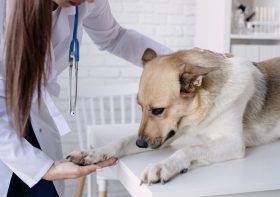Early Signs of Dental Problems in Pets and How to Recognize Them

Dental health is crucial for pets, just as it is for humans. Ignoring dental issues in pets can lead to severe health problems that extend beyond just the mouth. Understanding the early signs of dental problems can help you take proactive steps and ensure your pet remains healthy and happy. This guide will help you recognize the early warning signs of dental issues and equip you with preventive measures to maintain your pet’s oral health.
Common Early Signs
1. Bad Breath
Persistent bad breath in pets, also known as halitosis, often indicates the presence of dental issues. While some odors are natural, a foul smell when your pet breathes can be a sign that dental care is needed, and it’s essential to address this with a visit to a dog dentist. Plaque and tartar buildup, as well as bacterial infections, can contribute to this persistent bad breath. Ensuring regular dental cleanings and check-ups can help mitigate this problem.
2. Red, Swollen, or Bleeding Gums
Red, swollen, or bleeding gums typically indicate gingivitis or periodontal disease. If left untreated, these conditions can progress and lead to more serious health issues, such as infections spreading to other organs. Gum inflammation is a significant sign that dental care is overdue. It’s essential to schedule an appointment with a professional vet for a thorough evaluation and cleaning.
3. Yellow or Brown Tartar Buildup on Teeth
Tartar buildup on your pet’s teeth often appears yellow or brown. This buildup is hardened plaque that can lead to gingivitis and other periodontal diseases. When you notice tartar on your pet’s teeth, it’s a clear indicator that they need professional cleaning to prevent further oral health deterioration.
4. Excessive Drooling
Unusual or excessive drooling in pets can also signal dental problems. Conditions like tooth decay, gum disease, or oral infections can cause discomfort and excessive saliva production. If your pet is drooling more than usual, it’s time to examine their mouth for potential dental issues and consult a vet.
5. Reluctance to Eat or Difficulty Chewing
If your pet avoids food or shows difficulty chewing, it can be a sign of dental pain or discomfort. This behavior often indicates underlying dental issues such as broken teeth, gum disease, or oral infections. Addressing these problems with professional dental care is crucial to ensuring your pet can eat comfortably and maintain proper nutrition.
6. Pawing at the Mouth or Face
Pets may paw at their mouth or face due to discomfort or pain caused by dental problems. This behavior is often a response to underlying issues such as loose teeth, infections, or abscesses. Observing this behavior should prompt you to check for any visible dental issues and seek veterinary advice promptly.
7. Loose or Missing Teeth
Loose or missing teeth in pets are usually a late sign of advanced dental disease. This condition not only affects their ability to eat but can also lead to severe pain and infections. Recognizing this sign early and taking timely action by consulting a vet is indispensable for your pet’s well-being.
Detailed Descriptions
1. Bad Breath
One of the earliest signs that your pet may need dental attention is persistent bad breath. While occasional bad breath might be normal, a consistent foul odor often indicates underlying dental issues such as plaque buildup or bacterial infections. Regular dental cleanings can help manage this issue effectively. If the foul breath is persistent, consult a pet dentist for a professional check-up.
2. Red, Swollen, or Bleeding Gums
Gingivitis, characterized by red, swollen, or bleeding gums, indicates that your pet’s gums are inflamed and possibly infected. If left untreated, this condition can progress to periodontal disease. It’s crucial to seek medical intervention from a professional vet in Parrish to prevent the condition from worsening.
3. Yellow or Brown Tartar Buildup on Teeth
Tartar buildup on your pet’s teeth is visibly yellow or brown. It’s a hardened accumulation of plaque that can lead to severe gum diseases if not addressed. Regular dental cleaning by a veterinarian can prevent tartar buildup, promoting healthier gums and teeth. Including this step in your pet’s routine care can significantly reduce the risk of dental issues.
4. Excessive Drooling
If your pet drools excessively, it could indicate dental pain or discomfort. Issues such as tooth decay, gum disease, or oral infections often cause this symptom. Monitoring your pet’s drooling habits and consulting with a veterinarian ensures that potential dental issues are promptly addressed.
5. Reluctance to Eat or Difficulty Chewing
Dental pain can cause your pet to avoid food or have trouble chewing. This behavior may indicate serious dental conditions, such as broken teeth or oral infections, that require immediate veterinary care. Ensuring your pet’s dental health with regular check-ups and cleanings can help prevent such discomfort.
6. Pawing at the Mouth or Face
Pets may paw at their mouth or face if they are experiencing dental discomfort. This behavior often suggests the presence of dental issues like loose teeth or infections. Observing this and seeking prompt veterinary consultation can prevent further complications.
7. Loose or Missing Teeth
Loose or missing teeth in pets are usually a sign of advanced dental disease and should not be overlooked. This condition can cause significant pain and lead to infections. Immediate veterinary intervention is necessary to address this issue and ensure your pet’s overall health.
Preventive Measures
Regular Brushing and Dental Chews
Maintaining your pet’s dental health involves consistent at-home care. Brush your pet’s teeth regularly using pet-safe toothbrushes and toothpaste to remove plaque and prevent tartar buildup. Additionally, providing dental chews can aid in mechanically cleaning their teeth and gums, reducing the risk of dental diseases.
Scheduled Veterinary Dental Check-Ups
Regularly scheduled dental check-ups with a professional vet are crucial for maintaining your pet’s dental health. These check-ups enable early detection of dental issues and a more thorough professional cleaning than what can be achieved at home. Routine visits ensure your pet’s teeth and gums remain healthy.
Proper Diet
Feeding your pet a balanced diet is essential for their overall health, including their dental health. Avoiding sugary treats and providing foods that promote dental cleanliness can significantly reduce the risk of dental diseases. A diet rich in necessary nutrients supports strong teeth and healthy gums.
Moreover, maintaining your pet’s overall health goes beyond dental care alone. Ensuring they receive comprehensive pet vaccinations can protect them from a host of diseases, thereby supporting their general well-being.
Final Thoughts
Recognizing the early signs of dental problems in pets is crucial for maintaining their overall health and well-being. Regular professional dental care, consistent at-home hygiene practices, and proper nutrition all play a significant role in preventing dental diseases. If you notice any signs of dental problems, consult your veterinarian promptly to ensure your pet enjoys a long and healthy life.
By following these guidelines and maintaining vigilant observation, pet owners can effectively manage their pets’ dental health, ensuring a happier, healthier life for their furry companions


